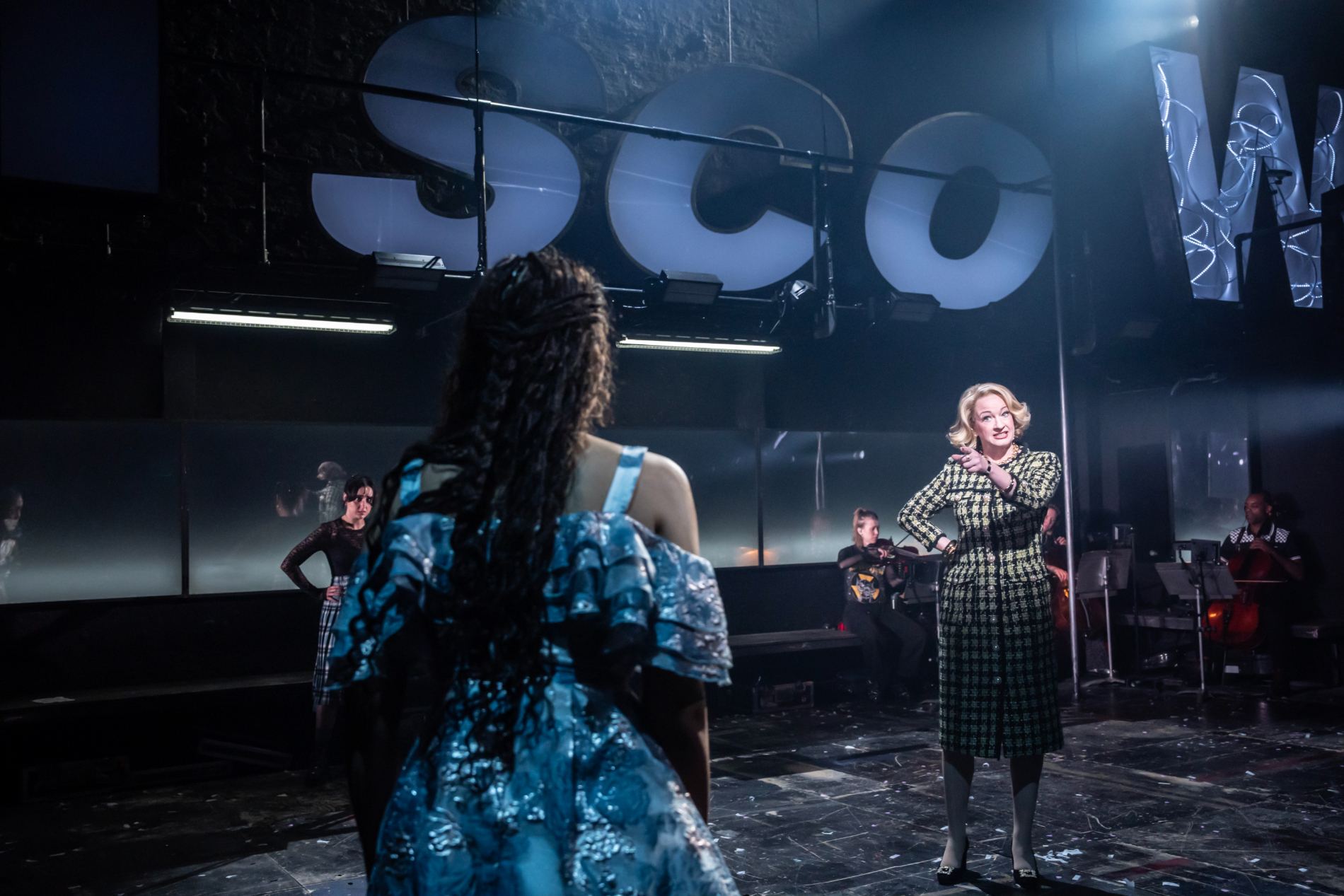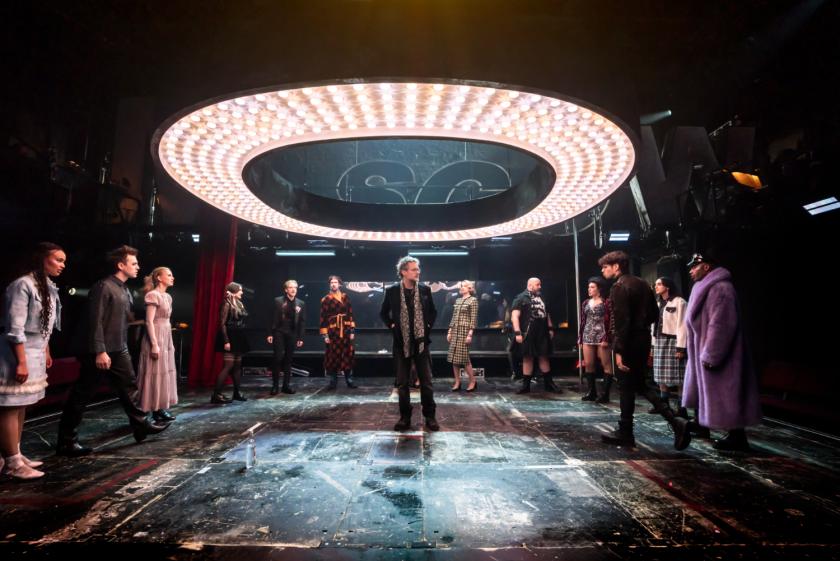Broadway shows sometimes hit the West End like, well, like a comet, burning brightly but briefly (Spring Awakening, for example), while others settle into orbit illuminating Shaftesbury Avenue with a neon blaze every night for years.
So it might be a wise decision to install Dave Malloy’s much-awarded, 2016 musical, Natasha, Pierre & the Great Comet of 1812, in the bijou Donmar Warehouse – fortunately, it’s a gem of a show.
“It’s not exactly War and Peace!” was a meme before there were memes, said of anything that was a little too facile to satisfy, the slabby novel a shorthand reference for anything challenging but rewarding. Perhaps taking that reputation on board, Malloy pulls the focus on to a 70-page extract of Tolstoy’s epic to create a wild, intense, operatic explosion, suffused with the transgressive passions that animate Moscow (then and now) and delivered in a rollercoaster two hours that goes to 11 and stays there.
First though, we get a warning (useful to the man who was once 100 pages into The Brothers Karamazov before realising that Alexei, Alyosha and Sasha were all the same brother). The dramatis personae introduce themselves with a number that insists that Russian novels are complicated and that every character has nine names. I half-expected the oft-mentioned but absent Andrey to emerge at the end and announce himself, but he’s no Alexander Hamilton and, though there are parallels, this is no Hamilton. It’s actually something entirely of its own making, somewhere between the mayhem caused by ill-matched love in Sean Baker’s movie Anora and the disorienting Musical Theatre weirdness of Adam Guettel’s unforgettable Floyd Collins. It’s a smart show this and nothing is wasted, so what appeared to be a standard piece of introductory exposition also pulled us across the fourth wall (appreciation of the tightness of the space is such a key component of Tim Sheader’s assured direction) making us eavesdroppers rather than spectators. So we’re with naive Natasha as she falls for androgynous Anatole, and alongside Pierre while he goes through a very Russian existential crisis, before passions give way to compassion and he finds some solace. At several points, I felt an urge to intervene and stop Natasha myself (as I always do when Cio-Cio-San is being led astray by Pinkerton in Madama Butterfly), sure evidence that we’re in it not at it.
It’s a smart show this and nothing is wasted, so what appeared to be a standard piece of introductory exposition also pulled us across the fourth wall (appreciation of the tightness of the space is such a key component of Tim Sheader’s assured direction) making us eavesdroppers rather than spectators. So we’re with naive Natasha as she falls for androgynous Anatole, and alongside Pierre while he goes through a very Russian existential crisis, before passions give way to compassion and he finds some solace. At several points, I felt an urge to intervene and stop Natasha myself (as I always do when Cio-Cio-San is being led astray by Pinkerton in Madama Butterfly), sure evidence that we’re in it not at it.
Chumisa Dornford-May (pictured above with Maimuna Menon and Annette McLaughlin) gives our eponymous ingénue a touching vulnerability. Unlike Olga, Masha and Irina, she’s in Moscow, but, with her betrothed, Andrey, away fighting Napoleon, like those three sisters, she knows she wants more.
And that more turns up in the person of Anatole, a seductive bad boy, who falls for her, but nothing like to the extent that she falls for him. Jamie Muscato has something of the strut of the late 70s Billy Idol and he’s soon planning a white wedding elopement with the bewitched lovefool Natasha. Despite the pleading of her clear-eyed cousin, Sonya (Maimuna Memon, the best of a very strong set of singers), love brings ruin – Russian novels eh?
Meanwhile, Pierre (a compelling Declan Bennett) is drinking vodka and getting fat as the angst provoked by his bad marriage to the promiscuous Hélène (Cat Simmons) consumes him with self-pity, before the light of the comet brings enlightenment to his soul.
For all the qualities of the cast (and there’s plenty more I could mention, including a showstopping Cedric Neal cameo, apparently brought straight in from Old Compton Street) the real star of this show is its remarkable score. Played brilliantly by a ten strong band led by Sam Young, it comprises songs and recitative, big set piece numbers in a nightclub and showcases for heartrending solo songs. Though the eclecticism of the melodies’ inspirations span the frozen steppes of 19th century to the sweaty clubs of the pariah state of today, none are toe-tapping earworms you’ll be humming on the Tube home. That said, the technical skills required (how often do you hear singing in three-four time outside A Little Night Music?) and the virtuosity on display, more than compensate for such omissions.
It’s another indicator, with House Full notices going up online, that this is a production to delight hardcore MT connoisseurs. Roll in Ellen Kane’s erotic choreography and Evie Gurney’s continually surprising costume choices and what’s not to like?
There is something though. The best musicals (and operas, as this production has at least as much of the latter as the former about it) give us something with which to empathise, a hero alongside an anti-hero, redemption alongside temptation. There’s a cruelty that runs through this show, a calculating coldness, that chills. Sometimes characters direct it outwards, sometimes they turn it inwards, but eventually it inhabits your own soul – the downside of that initial demolition of the fourth wall.
Ultimately, one emerges blinking into Covent Garden’s Christmas throngs with the view that a memorable, unique, show has proved easier to admire than to love. If only Natasha had thought the same of Anatole…













Add comment